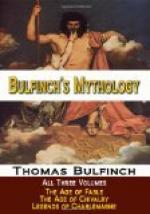We will now return to Orlando, whom we last heard of as furiously mad, and doing a thousand acts of violence in his senseless rage. One day he came to the borders of a stream which intercepted his course. He swam across it, for he could swim like an otter, and on the other side saw a peasant watering his horse. He seized the animal, in spite of the resistance of the peasant, and rode it with furious speed till he arrived at the sea-coast, where Spain is divided from Africa by only a narrow strait. At the moment of his arrival a vessel had just put off to cross the strait. She was full of people who, with glass in hand, seemed to be taking a merry farewell of the land, wafted by a favorable breeze.
The frantic Orlando cried out to them to stop and take him in; but they, having no desire to admit a madman to their company, paid him no attention. The paladin thought this behavior very uncivil; and by force of blows made his horse carry him into the water in pursuit of the ship. The wretched animal soon had only his head above water; but as Orlando urged him forward, nothing was left for the poor beast but either to die or swim over to Africa.
Already Orlando had lost sight of the bark; distance and the swell of the sea completely hid it from his sight. He continued to press his horse forward, till at last it could struggle no more, and sunk beneath him. Orlando, nowise concerned, stretched out his nervous arms, puffing the salt water from before his mouth, and carried his head above the waves. Fortunately they were not rough, scarce a breath of wind agitated the surface; otherwise, the invincible Orlando would then have met his death. But fortune, which it is said favors fools, delivered him from this danger, and landed him safe on the shore of Ceuta. Here he rambled along the shore till he came to where the black army of Astolpho held its camp.
Now it happened, just before this time, that a vessel filled with prisoners which Rodomont had taken at the bridge had arrived, and, not knowing of the presence of the Abyssinian army, had sailed right into port, where of course the prisoners and their captors changed places, the former being set at liberty and received with all joy, the latter sent to serve in the galleys. Astolpho thus found himself surrounded with Christian knights, and he and his friends were exchanging greetings and felicitations, when a noise was heard in the camp, and seemed to increase every moment.
Astolpho and his friends seized their weapons, mounted their horses, and rode to the quarter whence the noise proceeded. Imagine their astonishment when they saw that the tumult was caused by a single man, perfectly naked, and browned with dirt and exposure, but of a force and fury so terrible that he overturned all that offered to lay hands on him.




